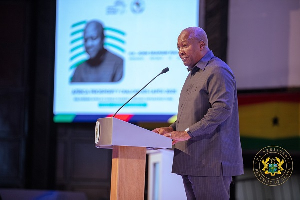Sunyani (B/A), Feb. 21, GNA - The Livelihood Empowerment Against Poverty (LEAP) intervention is meant to empower a targeted population and not to provide for their basic needs, Mr Stephen Adongo, Director of Child Rights, Department of Social Welfare, said in Sunyani on Friday. He reiterated that the government-introduced intervention would serve as a 'spring board' to help the target population to 'leap' out of the malaise of extreme poverty and not to make the poor dependent on government as projected by a section of the media.
Illustrating the programme, the Director said extremely poor households would be provided with "fish and taught how to fish" by linking them to other complementary programmes.
Speaking at a workshop on the LEAP programme and the National Social Protection Strategy, organised by the Ministry of Manpower, Youth and Employment, Mr Adongo stressed that under the intervention, 20 per cent of 880,000 extremely poor persons would be targeted. He stated that under the programme, a monthly stipend of GH¢8.00 to a maximum of GH¢15.00 would be paid per household but that would depend on the number of people who would qualify.
The Director, however, stated that due to the incapability of the sector Ministry and the Department's shortfall in logistics, payments would be made every two months, beginning January, this year.
Mr Adongo said beneficiaries would be expected to converge at a designated pay point chosen by the Ghana Posts and identity cards would be issued to them before any payment would be made.
Already, 21 pre-pilot districts have been selected and 10 regional social welfare and 21 district welfare officers are also being trained for the programme, he added.
In an address read for him, Mr Ignatius Baffour-Awuah, Brong-Ahafo Regional Minister, said it was the philosophy of the NPP government to maximize the nation's human resource potentials.
"In this respect government has developed a mission to support the vulnerable, marginalized and the excluded to become active partners in development", he stated.
The Regional Minister added that "the vision of creating an all inclusive and socially empowered society is on course through the provision of sustainable interventions such as the National Health Insurance Scheme (NHIS), Capitation Grant, School Feeding Programme, Agricultural Input Support and Micro-Financial Schemes for the protection of persons living in situations of extreme poverty and deprivation".
Speaking on Financing Social Protection in Ghana, Mrs Angela Asante Asare, Programme Coordinator, National Social Protection Strategy, Ministry of Manpower, Youth and Employment, said the government was expected to dole out over 11 billion dollars to support the Social Protection Strategy programme.
Mrs Asare said the programme would be cost effective, sustainable and efficient.
Presenting a paper on the 'Concept and Practice of Social Protection', Mr Daniel Doh, Senior Research Officer, Centre for Social Policy Studies, Legon, observed that it was the primary obligation of the state to provide protection for the poor and the weak in society as a matter of ethics.
He explained that the purpose of the introduction of the National Social Protection Strategy was to reduce multi-dimensional deprivation as a result of the failure of several government interventions like the Structural Adjustment Programme, PAMSCAD and other Breton-Woods and UN prescriptions.
Mr Doh said Britain and the US were still practicing similar programmes even up until now and dated back to the 16th, 17th and 20th centuries.
The strategy, he stressed, would target three groups namely care givers grant scheme for orphan/vulnerable children, persons with disabilities and social grants for the extremely poor and those aged above 65 years.
The pilot programmes run for five years, giving quality subsistence grants for beneficiaries so that they did not become destitute, Mr Doh added.
General News of Thursday, 21 February 2008
Source: GNA
















